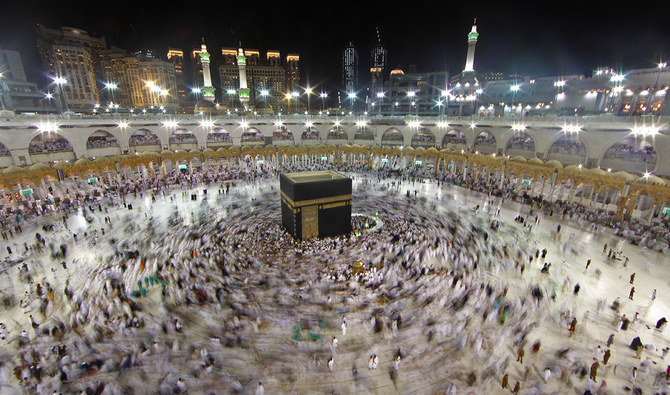ISLAMABAD: Religious affairs minister Aneeq Ahmed unveiled Pakistan’s Hajj Policy 2024 on Thursday, announcing that the cost of the Hajj package under the government’s scheme has been reduced by Rs100,000 ($347.92) this year.
Hajj is an annual, Islamic pilgrimage that each Muslim adult is required to perform at least once in their lives if they are physically and financially able to do so. The sacred pilgrimage is usually one of the world’s largest religious gatherings where Muslims offer prayers and perform certain rituals in the holy city of Makkah.
This year, Saudi Arabia restored Pakistan’s pre-coronavirus Hajj ratio of 179,210 pilgrims and also lifted the upper age limit of 65 years to perform the pilgrimage. More than 81,000 Pakistani pilgrims performed Hajj under the government scheme in 2023 while the rest used private tour operators.
Saudi Arabia has allotted Pakistan a quota of 179,210 pilgrims for Hajj this year, Ahmed told reporters during a press conference.
“The previous Hajj, which was held in a very impressive manner, cost Rs11,75,000 [$4,088],” Ahmed said. “It makes me very happy to announce that our package this year will cost Rs10,75,000. [$3,740].”
The minister said Pakistan was locked in negotiations with airlines to reduce their airfares for Hajj flights. “The amount that we save on account of air tickets will be deposited into the Hajj pilgrims’ accounts,” he said.
Ahmed said Hajj 2024 for Pakistani pilgrims would be “digitized” as pilgrims would be provided an app on their phones that would help them find locations in Makkah easily.
“We are also in talks with a mobile company. [Pilgrims] would be provided 7 GB data for the app,” he said, adding that it would function even without the Internet.
He said that usually pilgrims performing Hajj under the government scheme spend eight days in Madinah. However, he said if pilgrims choose to spend only four days in the city this year, they can save Rs35,000 ($121.77].
Ahmed announced that Pakistan’s southern port city of Karachi has also been included in the Makkah Route initiative for Hajj 2024, adding that Pakistan had requested the Saudi government to include Lahore in the initiative as well.
“We have also requested that Quetta and Peshawar should be included [in the Makkah Route Initiative],” he said. “But at least include Lahore in it.”
The Makkah Route Initiative provides pilgrims with the convenience of completing their entry procedures to Saudi Arabia in their home countries’ airports.
Ahmed said the government would start receiving Hajj applications from Nov. 27, adding that the process would continue till Dec. 12.
















